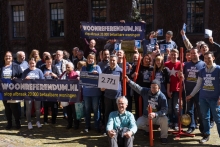Session program
| Session | |
|---|---|
|
Extension showcase In this session you and others could show off some usefull extensions. The following extensions are going to be demonstrated: - Mosaico: An user fiendly way of designing mass mailings with Various speakers Conference Room (3rd) |
| Session | |
|---|---|
|
Migrating to CiviCRM Starting to use any new database can be a pain and CiviCRM is no exception. Not only will you need to deal with migrating your data including all technical pitfalls - before you even get there, you should have a coherent concept for using CiviCRM. In this session we will give an introduction to CiviCRM's logic and data structure and discuss what you need to consider when you want to start using CiviCRM. Apart from the technical side, we will also take a look at aspects of organisational development because they can affect the success or your project as much as the technical set up of your systems. with Fabian Schuttenberg (Systopia) Conference Room (3rd) |
|
|
Using CiviCRM to change the world... one city at a time 300,000 signatures from citizens who are eligible to vote - that's what's needed to make a nationwide referendum in The Netherlands happen. Many Dutch cities have similar provisions for local referendums. In this session, we'll talk about (Read this article in Dutch for some more background info) with Kevin Levie Room ‘Groene Hart’ (3rd) |
 |
|
We are family! Households in CiviCRM Keeping track of household relationships is not only about knowing your donors. It's also about efficient communication, in quality and quantity alike. We present different ways of modelling and using households, describe best practices, and explain the necessary tools - including a newly developed extension. with Björn Endres (Systopia) Room ‘Kaas’ (3rd) |
 |
| Session | |
|---|---|
|
Closing session Round up of the day and afterwards you are invited for drinks. with Conference Room (3rd) |








